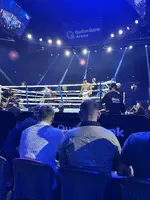Heavyweight boxing icon George Foreman dies aged 76, family confirms
Former heavyweight champion George Foreman, who fought and lost against Muhammad
Ali in boxing’s iconic 1974 “Rumble in the Jungle” before reclaiming the title two decades later, has died aged 76, his family announced in a statement.
“With profound sorrow, we announce the passing of our beloved George Edward Foreman Sr, who peacefully departed on March 21, 2025, surrounded by loved ones,” Foreman’s family said in a statement posted on the boxer’s official Instagram page.
“A humanitarian, an Olympian, and two-time heavyweight champion of the world, he was deeply respected - a force for good, a man of discipline, conviction and a protector of his legacy, fighting tirelessly to preserve his good name - for his family,” the statement added.
“We are grateful for the outpouring of love and prayers, and kindly ask for privacy as we honor the extraordinary life of a man we were blessed to call our own.”
Born in Texas on January 10, 1949, Foreman grew up in Houston. The man who raised him was frequently absent and often drunk. Foreman only found out that J. D. Foreman was not his biological father after he won the world heavyweight when his real father, a decorated Second World War veteran, got in touch.
As an adolescent Foreman flirted with crime and dropped out of school at 16.
“At 13-years-old, George was about 6-foot-2, 200 pounds and the terrorist in the neighbourhood,” his younger brother Roy told the BBC in 2024. “And when you’re bigger and stronger and think you’re better than everyone else, you take things.”
At 16, he took up boxing.
“I wanted to a football player,” Foreman said on his website. “I tried boxing just to show my friends that I wasn’t afraid. Well, 25 fights and one year later, I was an Olympic gold medallist.”
At the Mexico Games in 1968, the 19-year-old Foreman bludgeoned his way to the super-heavyweight gold. As he celebrated his final victory, 10 days after fellow African Americans Tommie Smith and John Carlos had made a black power salute following the 200m track final, Foreman waved an American flag in the ring.
At 6-foot-4 (1.93m), ‘Big George’ was larger and stronger than the other leading heavyweights of the time. He was light on his feet, but slugged his way through the professional ranks, to earn a heavyweight title shot against champion Joe Frazier, demolishing the champion in two rounds.
By the time he fought his third title defence over 15 rounds against
Ali in October 1974 in Kinshasa, Foreman was unbeaten in 40 professional bouts. He had won all but three inside the distance and had not needed to develop stamina.
Ali’s ‘rope-a-dope’ tactics, exhausted the big man who lost in eight rounds.
The defeat punctured Foreman’s intimidating aura, not least, in his own mind.
“I just couldn’t believe I’d lost the world title,” he said later. “It was the most embarrassing moment of my life. It went from pride to pity. That’s devastating.”
His campaign for another title shot ended when he lost on points to another contender, Jimmy Young in March 1977 on a hot night in Puerto Rico.
Foreman fell ill after the fight and said he sensed God telling him to change his life.
He retired, aged 28 and became an ordained minister. When he announced his comeback 10 years later, bald where he had once sported an afro and flabby instead of chiseled, it seemed like a boxing gimmick. He wrote later that he needed money for his youth centre.
Over the next three years he fought 21 times, mostly against mediocre opponents, winning every bout, 20 of them inside the distance.
A big name in a weakened and fragmented division, he earned a title shot against Evander Holyfield in 1991 and then against Tommy Morrison two years later, losing both on points.
In November 1994 he faced Michael Moorer, who had dethroned Holyfield. In the same shorts he had worn 20 years and six days earlier against
Ali, Foreman was trailing badly when he caught Moorer on the chin in the 10th for a knockout. At 45 years and 299 days old he was the oldest heavyweight world champion.
He was stripped of first his WBA title and then his IBF title for refusing to fight nominated opponents but won three more fights and was still ‘lineal’ world champion when he lost on points to Shannon Briggs in 1997, aged 48, and retired again.
He fought 81 times as a professional, winning 76, 68 of those by a knockout.
In 1994, he put his name to the “George Foreman Lean Mean Fat-Reducing Grilling Machine”, appearing smiling and friendly in the TV ads, becoming a celebrity outside boxing.
Foreman, who hosted a 1996 TV programme ‘Bad Dads’, married four times, fathering 10 children and adopting two.
He named all his five sons George Edward, explaining that he wanted them to know, “‘If one of us goes up, then we all go up together, and if one goes down, we all go down together!’”
'He was deeply respected – a force for good, a man of discipline, conviction.'

www.nzherald.co.nz
RIP Big Man!!!!



